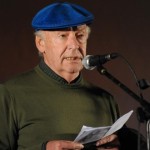(A slightly revised version of this piece, printed after Zidane’s first public statement hinted not at racism but to insults to his mother and sister, appeared in The Ottawa Citzen on Friday, July 14, 2006.)
The comparisons will be flying. Can you imagine Gretzky clobbering an opponent over the head in Game 7 of the Stanley Cup finals? Derek Jeter charging the mound to spike the pitcher in the deciding game of the World Series? Michael Jordan decking the guy guarding him with the championship about to be decided? No valid parallels exist in professional sport, to my knowledge, for the moment Zinedine Zidane chose to settle a personal score when there was so much at stake for the team he captained. It was a shocking thing, more for its incredibly bad timing than for the violence of the act itself (which was considerable).
It was clear that the Italians were harassing Zidane physically; but when in his starry career has this not been the case? It was obvious that Materazzi said something vile, something that froze the French captain in mid-stride and brought down the blinding beams of rage; but what taunts hadn’t this child of a poor Algerian immigrant family already heard? And yes, there had been a remarkable Buffon save on what looked like France’s Cup-winner from that same powerful forehead. The rock-hard Cannavaro’s elbow smash, possibly inadvertent, to Zidane’s shoulder? Sure, that happened. Frustrating and brutal things often occur in the context of championship sport, and the mark of the champion is fortitude under the most severe of trials. There is nothing to conclude except that Zinedine Zidane, in the greatest pressure situation of his athletic life, abandoned teammates and national honour in a fit of anger. It was a bizarre act by a sporting idol, one of the most selfish acts we have ever seen from a great and graceful athlete.
Unless it wasn’t. Unless our tendency to attribute heroic character to a man with athletic gifts hasn’t tripped us up again. And maybe, just maybe, unless we have once again assumed that what happens in a World Cup final match is more important than life itself (or racism, or other forms of inhumanity). French athletic supporter that I am (at least during World Cup), I know what my first outraged question was after the head-butt: What could possibly be more important right then than winning the Cup? I was furious with this man I don’t know, whose career I’ve followed about every fourth year. And I guess, too, I wanted to believe in that persistent myth, reincarnated again with Zidane: the superb sportsman as ambassador of good, as role model to the world, as spokesman and exemplar for the most humane of causes.
But I remember the words of a prominent American basketball coach, who told me, “I’ve never known a great player who wasn’t a bit of a jerk.” Good genetics aside, how does someone like Zidane graduate from the ferocious street football games of his impoverished youth to become a star? By never backing away from insults and challenges. By inspiring fear in opponents. By being a hard, hard man. By sporting an ego bigger than all the barriers he faced.
Countering my shocked disbelief was my soccer-savvy friend, who nodded quietly and said, “Do you remember him stomping on the Saudi in ’98? (I didn’t.) Do you remember his head-butt with Juventus? (Um, no.) He’s been red-carded many times.” Zinedine Zidane has to win, and he has to win right now. Amateur psychologists like me might mutter sagely about self-absorption, about “the inability to delay gratification” that is the hallmark of all sorts of immaturity. And this would be true.
But there is more to be heard of this. There are some who would seek to excuse Zidane, or at least to diminish our self-righteous horror (“I would never do such a thing!”). One of the most extreme apologist voices is the American Dave Zirin (“Why Today I Wear My Zidane Jersey”) (http://www.edgeofsports.com/2006-07-11-193/index.html), who frames the incident as Zidane’s way of standing against racism and Islamophobia, as an assertion that some things are just BIGGER than sport. And I agree that many things are more important than winning the big game. Included in that list, though, are dignity and self-control, the needs of your companions and the art of the long view. Zinedine Zidane’s scorecard is not yet complete. I still want to believe that nice guys can finish first in all the most important contests, but it would appear that neither the French star nor his Italian antagonist would qualify.

